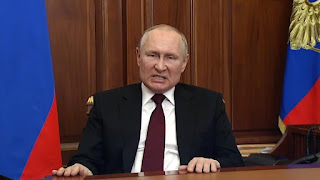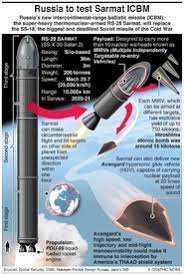(Jamie Seidel’s article from the NEWS.COM.AU on 02 March 2022.)
 |
| I'll nuke y'all, Motherfuckers! |
An analyst from the Royal United Services Institute
(RUSI) told Reuters on Wednesday (March 2) that Russia was switching to more
"brutal tactics” after describing its invasion of Ukraine as a 'poorly
executed operation’.
When it comes to Russian President Vladimir Putin, it’s time to expect the unexpected. And that – leading analysts say – applies to nuclear weapons. They said he couldn’t. Then they said he wouldn’t. But he could and has. Repeatedly.
He’s already
used a biological weapon: Weapons-grade nerve agent Novichok poisoned a
defector and others in Salisbury, England. He’s already used a nuclear weapon:
Outspoken critic Alexander Litvinenko was dosed in London with radioactive
plutonium, effectively turning him into a “human dirty bomb”.
He’s using the
bulk of his military to invade a neighbouring country. Now President Putin is
threatening the use of nuclear weapons. “Every time you think,’ No, he
wouldn’t, would he?’ Well, yes, he would,” says Russia specialist and former US
National Security Council advisor Fiona Hill. “And he wants us to know that, of
course.”
But the prospect
of “mutually assured destruction (MAD)” has held an uneasy peace for decades
following the end of World War II. Would Putin risk such an extreme outcome?
“I’ve watched
and listened to Putin for over 30 years. He has changed,” says former US
ambassador to Russia and Stanford University professor Michael McFaul. “He
sounds completely disconnected from reality. He sounds unhinged.”
And he’s already
told us what he thinks about being a “cornered rat”. President Putin grew up in
a communal apartment building in St Petersburg. It was a rough, tough, crime
and rodent-ridden neighbourhood.
Two decades ago,
Putin recalled a childhood incident that he said had helped shape his life. “There,
on that stair landing, I got a quick and lasting lesson in the meaning of the
word ‘cornered’,” he wrote of himself in 2000.
“There were hordes of rats in the front entryway. My friends and I used to chase them around with sticks. Once I spotted a huge rat and pursued it down the hall until I drove it into a corner. It had nowhere to run. Suddenly it lashed around and threw itself at me. I was surprised and frightened. Now the rat was chasing me. It jumped across the landing and down the stairs. Luckily, I was a little faster and I managed to slam the door on its nose.”
Putin may now see
himself as that cornered rat. He’s a strongman. He can’t afford to appear weak.
The biggest gambit of his life is floundering. He is an international pariah.
And his grip on managing the messages being consumed by his own people is
slipping.
“The question
becomes, which is the bigger fear: The fear that he’ll look weak if he walks it
back, or the fear that the situation for Russia will get much worse if he steps
it up?” says New York University Russia expert Joshua Tucker. “That’s what
makes this a dangerous moment.”
He has a long
way to back down. Putin has tried to portray Ukraine as an illegitimate state. He
claims it always has been – and always will be – part of the “Russian Empire”. And
repeatedly accusing President Volodymyr Zelenskyy of being a “genocidal
neo-Nazi” simply doesn’t fit with a man of Jewish heritage (who lost family in
Nazi concentration camps) who is also a native-born Russian speaker.
Strangely, Putin
seems to believe his own propaganda. He has repeatedly urged the Ukrainian
military to seize power – totally misunderstanding the country’s hatred towards
Moscow. Putin has had a long time to surround himself with sycophants. Nobody
dares speaks inconvenient truths in his earshot.
Politicians.
Advisors. Media. All have been recirculating his propaganda for decades. “For
now, only one thing is clear: Putin prioritised his personal obsession above
Russia’s interests,” writes European Council on Foreign Relations analyst Kadri
Liik.
“Basically, what
President Putin has said quite explicitly in recent days is that if anybody
interferes in Ukraine, they will be met with a response that they’ve ‘never had
in history’,” Hill told Politico. “And he has put Russia’s nuclear forces on
high alert. So he’s making it very clear that nuclear is on the table.”
On February 21,
President Putin addressed his nation in a televised speech. He announced the
invasion of the Donbas region of Ukraine. He didn’t tell his own people the
assault was much broader than that. But the above threat was a clear threat
against NATO countries – should they interfere.
Then, on
February 27, after his initial invasion force was blunted, he ordered his
nuclear forces into a “special mode of combat duty”. This activated a normally
dormant nuclear command-and-control network.
UK-based international affairs think-tank Chatham House analyst Dr Patricia Lewis warns this move is significant. “It is seen as a pathway for Russia to use its nuclear weapons in a first strike surprise attack,” she writes. “This is a highly dangerous situation in which mixed messaging with the potential for misinterpretation could lead to decisions being made under false assumptions.”
It’s a threat.
It’s intended to give Putin a ticket to act freely in Ukraine. And Putin has a
long history of following through with his threats. The thing about Putin is if
he has an instrument, he wants to use it. Why have it if you can’t?” says Hill.
“It’s not that
we should be intimidated and scared. That’s exactly what he wants us to be. We
have to prepare for those contingencies and figure out what is it that we’re
going to do to head them off.”
What could drive
a world leader widely regarded as “savvy”, “smart”, and “strategic” in his
thinking to put the world on the brink of destruction? Opinions vary. “I wish I could share more, but for now, I
can say it’s pretty obvious to many that something is off with Putin,” wrote
Republican Florida senator and Senate Intelligence Committee chair Marco Rubio.
“It would be a mistake to assume this Putin would react the same way he would
have five years ago”.
It is “clear he
is truly divorced from reality. This is a tragedy,” writes Russian analyst Mark
Galeotti. Mad? Deluded? Is it all just another of the former KGB agent’s
cynical ploys? But there may be another motivating factor. His health.
“Putin’s not
looking so great. He’s been rather puffy-faced,” Hill told Politico. “We know
that he has complained about having back issues. Even if it’s not something
worse than that, it could be that he’s taking high doses of steroids, or there
may be something else. There seems to be an urgency for this that may also be
driven by personal factors.”
President Putin
is 69. The average life expectancy of a Russian male is just 66 years. And he’s
showing a tendency towards emotional outbursts. “Nravitsya, ne nravitsya —
terpi moya krasavitsa,” President Putin said after meeting French President
Emmanuel Macron: “You may like it, you may not, but you’ll have to endure it,
my beauty.”
It was a
reference to lyrics from a necrophilic-rape punk song. “This visceral emotion
is unhealthy and extraordinarily dangerous because there are few checks and
balances around Putin,” warns Hill.
Instead, Putin
may be tempted to use smaller “tactical” nuclear warheads against Ukraine as
drastic proof of the reality of his threat. Dr Lewis says the West would have
an early indication of this being about to happen.
“Any movement to
ready and deploy Russian nuclear weapons would be seen and monitored by US and
others’ satellites, which can see through cloud cover and at night,” she
writes. These would then be loaded in bombers, artillery or warships. Specific
command-and-control networks would have to be activated.
That is the first point of extreme escalation risk. “NATO
countries may decide to intervene to prevent launch by bombing storage sites
and missile deployment sites in advance,” Dr Lewis warns.
The next escalation risk comes after such a weapon is used. “NATO countries would most likely respond on the grounds that the impact of nuclear weapons crosses borders,” she says. This response doesn’t have to be nuclear. It could involve a large-scale conventional war.
“But both
scenarios mean NATO being drawn into a major war with Russia, and so the
advantage of deciding to hold back on nuclear retaliation – and communicating
that response now – is that Putin cannot portray NATO as threatening Russia
with nuclear weapons,” Dr Lewis adds.
“It is always possible – although assumed to
be highly unlikely – that Putin may decide to launch a long-range ballistic
missile attack against the US, but he knows – as do all his officials – that
this would be the end of Russia.”



